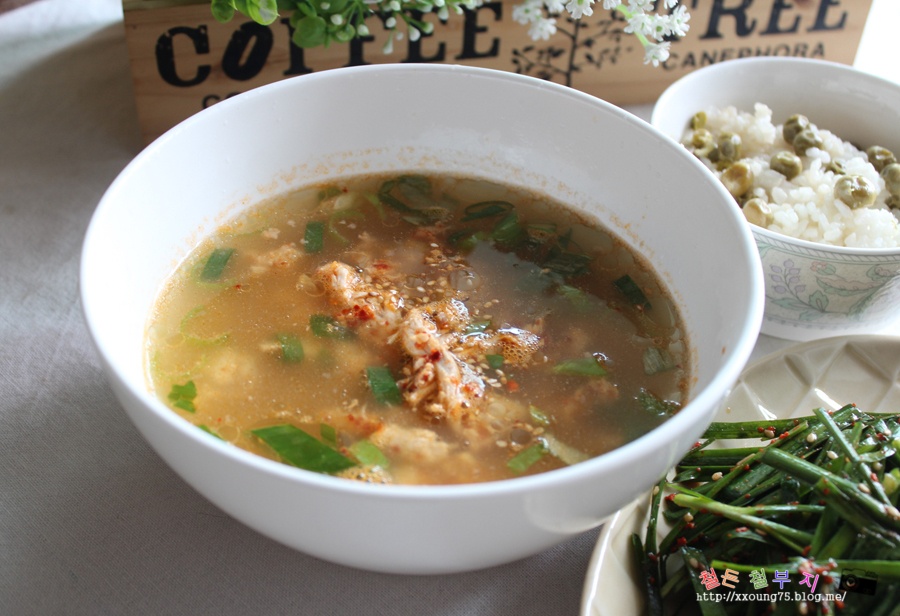Spicy and Refreshing Sam-Sik-Sik Dak Gom Tang
Hearty and Spicy Chicken Soup Recipe, Just Like Sam-Sik-Sik

As the weather gets warmer, why not make a nourishing chicken soup for your family? While different from Samgyetang, our family prefers the rich, comforting broth of Dak Gom Tang, perfect for a hearty rice soup. This recipe, inspired by the popular TV show ‘Sam-Sik-Sik’, adds a spicy kick that everyone will love, making it a delightful meal from kids to adults.
Dak Gom Tang Ingredients- 1 whole chicken (approx. 1kg)
- 1 stalk of green onion
- 10-15 cloves of garlic
- 1/2 onion
- Astragalus root (optional, to taste)
- Jujubes (optional, to taste)
- Water (enough to cover the chicken)
Seasoning for Shredded Chicken- 1/2 tsp minced garlic
- 2-3 tbsp gochugaru (Korean chili flakes, adjust to spice preference)
- 1 tbsp chopped green onion
- 1/2 chopped Cheongyang chili pepper (optional)
- Pinch of black pepper
- 1/2 tsp minced garlic
- 2-3 tbsp gochugaru (Korean chili flakes, adjust to spice preference)
- 1 tbsp chopped green onion
- 1/2 chopped Cheongyang chili pepper (optional)
- Pinch of black pepper
Cooking Instructions
Step 1
First, thoroughly wash the whole chicken under running water. Make sure to remove any internal organs or impurities.

Step 2
Removing the chicken skin and any visible fatty parts will result in a cleaner broth. (Optional) You can also blanch the chicken in hot water briefly to remove any residue before using it; this helps eliminate any gamey smell.

Step 3
After cleaning, trim away any remaining fatty deposits from the chicken. Then, soak it in cold water for a while to remove any residual blood. This step helps to further reduce any gamey odor and makes the meat more tender.

Step 4
To create a deep and rich broth, we’ll use various aromatic ingredients. While the TV show often uses plenty of onions and garlic, today we’re adding astragalus root and jujubes for added health benefits and a boost of energy! (Astragalus root and jujubes are optional and can be adjusted to your preference.)

Step 5
Drain the chicken and place it in a large pot. Add the prepared green onion, whole garlic cloves, jujubes, and astragalus root. Pour in enough water to generously cover the chicken. (Tip: To avoid boiling over, it’s safer to fill the pot only about two-thirds full.)

Step 6
Bring the pot to a boil over high heat, then reduce the heat to medium-low and simmer for at least 1 hour. Skim off any foam that rises to the surface during cooking for a clear and clean broth. A long, slow simmer will extract the most flavor from the chicken.

Step 7
Carefully remove the cooked chicken from the pot and let it cool slightly before shredding it into bite-sized pieces. Shredding the chicken while it’s too hot can cause the meat to break apart. It’s best to wait until it’s cool enough to handle comfortably.

Step 8
Arrange the shredded chicken attractively in a serving bowl. It’s now ready to be served with the rich chicken broth.

Step 9
Prepare some chopped green onion and Cheongyang chili peppers to serve with the Dak Gom Tang. The green onions add freshness, and the chili peppers provide a spicy kick if desired.

Step 10
In a separate bowl, combine the shredded chicken with the seasoning ingredients. Gently mix everything together. Adjust the amount of gochugaru to your preferred level of spiciness. (We used about 2 tablespoons as we don’t prefer it very spicy.) Add minced garlic, plenty of chopped green onion, and the optional chopped Cheongyang chili pepper for a delicious spicy chicken mixture.

Step 11
Adding this seasoned chicken back into the broth will give you a spicy Dak Gom Tang, similar to Dak-galbi. You can set aside some plain chicken and broth for children who prefer a milder taste, and then mix the spicy chicken into the remaining broth for the adults to enjoy.

Step 12
Ladle the milky chicken broth generously into bowls and top with a hearty portion of the shredded chicken. Your delicious Dak Gom Tang is ready! Served with well-fermented kimchi or kkakdugi (radish kimchi), it makes for a wonderfully satisfying meal. (Sadly, we’re out of kkakdugi today!)



